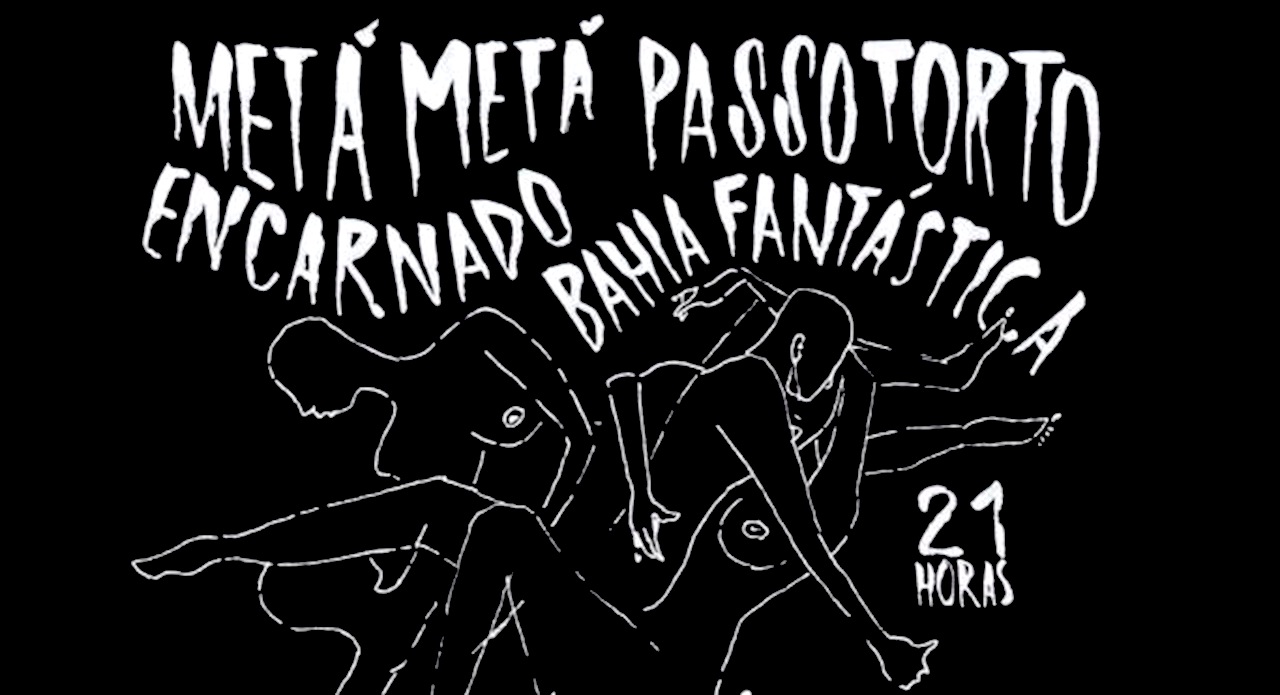São Paulo trio Metá-Metá synthesise punk, jazz, samba and candomblé into a coherent, visceral whole, whilst maintaining traditions of Brazilian song and folklore.
Their first release, simply called Metá-Metá, was a stunning debut, a modern take on the Afro-Sambas of Vinicius de Morais and Baden Powell and their mixing of Afro-Brazilian traditions and samba rhythms. Yet, there were already signs that the trio were ready to break out of that mould by adding in more aggression, experimenting with structures and pushing their instruments as the fiery closing tracks “Oranian”, “Obá Iná” and “Ora Iê iê O” attested. The guitar-work of Kiko Dinucci was mellifluous, Thiago França’s sax was soothing, even more so when he switched to flute, and Juçara Marcal’s voice was joyous, gliding in and out of the melodies, with a glorious delivery that was powerful and delicate at the same time.
MetaL MetaL, their second album, continues in this vein. There is no soothing opener. “Exu” is blunt, a sudden rush of dischordant guitar notes and strums, wailing sax and Marcal’s fervent voice. It’s a palette cleanser of an opening track, as afterwards the melodies return even if everything seems far more heated. Dinucci’s guitar is extra sharp, attacking notes in a way that reveals his early days as a musician playing in punk and hardcore bands. The trio are joined on the majority of the album by the bass of Marcelo Cabral and drums of Sergio Machado for a fuller sound, and one that takes them even closer to a rock or punk sound.
This freer, fuller and more aggressive sound has seen the group move away from the progressive samba scene of São Paulo that they were initially identified with and into their own territory, finding a meeting point between punk, free jazz and Afro-Brazil.
When MetaL MetaL received its international release earlier this year on Mais Um Discos the original track-listing was shaken up and augmented with two additional tracks that the group recorded with Tony Allen (best known as Fela Kuti’s drummer though gaining a reputation all his own these days thanks to great solo albums and collaborations with Damon Albarn, among others) in São Paulo last year. When I spoke to sax player Thiago França about Allen and the possible influence he had on their music he told me that it was “his polyrhythmic patterns and dislocated accents [that] really opened our minds to construct new grooves based on our most common rock/samba/candomblé/punk patterns.”
Though many reviews of MetaL MetaL have described the groups music as “afro-punk” this broader summary by França seems more apt, Metá-Metá is the sound of rock, samba, candomblé (a rhythm of Afro-Brazilian descent) and punk grooves played with the rebel spirit of afrobeat, a style that at its best is potent, free from normal song structures and designed to illicit an emotive response. This description makes perfect sense on songs like “Logun” and “Man Feriman”, extended jams that build and build, drawing influence on the countless sounds that have influenced these musicians.
The album has seen Metá-Metá consolidate their position as one of the most inventive groups in Brazil, it’s also a gateway into a hugely exciting music scene there, as all of the member play in a myriad of other projects. Juçara Marcal has flourished into a confident and distinctive singer, as her debut album, Encarnado, released earlier this year, proves. Kiko Dinucci also plays in the more song-based group Passo Torto, and has recently collaborated with Alessandra Leao, Lucas Santtana, Rodrigo Campos and Criolo, among others. Thiago França also likes to explore Ethiopian jazz and afrobeat in Sambanzo, play Colombian grooves in A Espetacular Charanga do França, freely experiment with MarginalS and record sambas under his own name. This restless spirit of discovering and playing music – extending to styles from all over the world, including Latin American and African styles as much as rock, jazz or punk – is one of the reasons why nobody else quite sounds like Metá-Metá, who are ostensibly a whole music scene in themselves.

